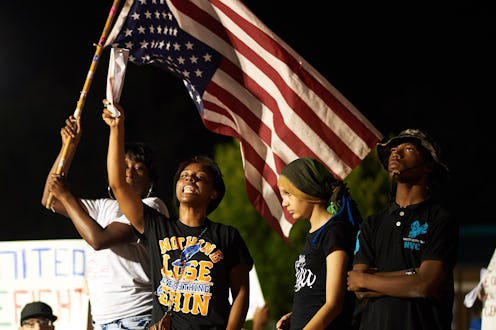News
Ferguson One Year Later: What's Changed?
It's been a rocky year for Ferguson, Missouri. In August 2014, the small, mostly black suburb of St. Louis quickly transformed into a catalyst for activism and conversations about race relations in America when Michael Brown, an unarmed black 18-year-old, was shot and killed by Darren Wilson, a white police officer. Protests broke out, some violence ensued, and many feel that justice has not been served. But amidst all the protests and violence, what has changed in Ferguson since Brown's death?
In many ways, Ferguson set a precedent for social activism — and how officials respond to it. Brown's shooting and the investigation that followed started national conversations about issues like race relations, racial profiling, and police brutality. It also gave new visibility and new context to organizations such as Black Lives Matter, which launched in 2012 after the fatal shooting of Trayvon Martin in Florida. Following the violence in Ferguson, cities like Baltimore and Cleveland preemptively prepared for the fall-out after similar deaths of black men in their own communities.
The lessons of Ferguson will remain longer than this first year. The fact that I can refer to the entire Brown-Wilson ordeal as "Ferguson" alone is a testament to the significance of what happened not only in that small Missouri city, but also in this country. Small changes have come to the community, though it's clear there is still a long way to go.
The Officer
Wilson, who wasn't indicted by a grand jury on any criminal charges, leads a very isolated life. In a recent profile by The New Yorker, Wilson revealed he feels "unemployable." The Ferguson Police Department will not take him back in fear his presence could incite violence and endanger other officers, the story reported. In the year since the shooting, Wilson has become a father. His wife, Barb, gave birth to a daughter in March. (He also has two stepsons.) He spends most of his time at home with his daughter and family, and he limits his time in public.
The Local Government
In the last year, the racial makeup of Ferguson's public officials has changed to better reflect the demographics of the community. Nearly 70 percent of Ferguson's population is black. After two new black members were elected in April, three of the six seats on Ferguson's city council are occupied by African Americans.
Former Ferguson Police Chief Thomas Jackson, who is white, resigned in March after the U.S. Department of Justice released a report that accused the Ferguson Police Department of discriminating against black residents. Former City Manager John Shaw, who is also white, resigned around the same time for similar reasons. The men who hold those positions now, Colonel Andre Anderson and Ed Beasley, respectively, are both black, but their both in interim positions, a detail that hasn't gone unnoticed by the community.
The Police Department
In addition to a new chief, the Ferguson Police Department has adopted new policies and added new recruits since last year. All Ferguson officers now wear body cameras. The city has made it a point to recruit minority officers. Currently, about 10 percent of the force is black, but there are more positions to fill.
The Brown Family
One year after their son's death, Michael Brown, Sr. said the family is still mourning. They're also urging protesters and activists — who still frequent the streets of Ferguson — to remain peaceful. Brown's father and mother, Lezley McSpadden, have opened a wrongful death suit to seek justice for their son's death. They are suing the city of Ferguson, Wilson, and former Police Chief Jackson. The suit claims that Wilson's use of force was unnecessary and the police department "had a custom or policy of negligently hiring and retaining officers" and failing to train them properly.
The City
Ferguson remains a hotbed for activism. To commemorate the one-year anniversary of Brown's death, demonstrators organized a march and a moment of silence on Sunday. They also planned a day of civil disobedience for Monday. But this time around, protests are much smaller and, so far, much more peaceful.
The city is healing in different ways, too. Since the shooting last August, the real estate market has struggled in Ferguson. Home prices have fallen and houses are selling more slowly — but they're still selling. NBC News reported many young families and single people are moving to the city to take advantage of the buyers' market — and to be a part of the recovery process.
There's no doubt that Ferguson — and the country as a whole — still has a long way to go. From making interim changes permanent to resolving legal battles once and for all, the road ahead is paved with new opportunities for the city, the people, and the symbol that is nationally known as Ferguson.
